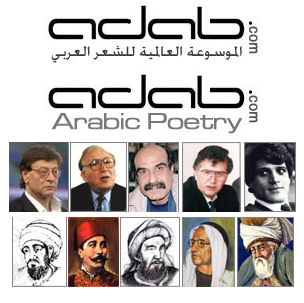
Looking for Arabic poetry online. There are many, many sites, but one useful resource is adab.com, which is also available in English. The site boasts 19027 verses “bayt” in 451 poems for 46 poets. Check it out.
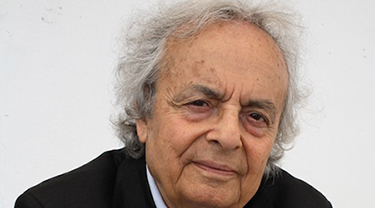
Cairo Review, May 14, 2014
A half century ago, the poet Ali Ahmad Said Esber, better known by his pen name Adonis, left Syria for exile, first to Lebanon and then France. He lives on an upper floor of a new apartment tower in the Paris suburb of Courbevoie, steps from La Grande Arche in the modern business district of La Défense. Embroidered cushions from his homeland are on the sofa, abstract paintings on the walls; Arabic and French newspapers are piled around, next to music CDs of Bach and Mahler; Lebanese sweets are served on a platter along with cups of Nescafé. He never stays in one place for long; at the end of April, he was off to New York to open the PEN World Voices Festival with Salman Rushdie and Noam Chomsky.
Adonis, 84, is widely recognized as the greatest living Arab poet. He began writing verse as a teenager in Qassabin, a village in Syria’s Latakia province. In Beirut in the 1950s, he started a modernist revolution that the Guardian has called “a seismic influence on Arabic poetry comparable to T.S. Eliot’s in the Anglophone world.†He has published twenty volumes of poetry and thirteen books of literary criticism, reflecting on everything from love and Arab nationalism to American power; in 2011, he became the first Arab writer to win the prestigious Goethe Prize for literature. Adonis, meanwhile, has long been a leading public intellectual in the Arab world. His most recent writings are collected in Printemps Arabes: Religion et Révolution, published in France earlier this year by Éditions de La Différence. According to his English translator, Khaled Mattawa, Adonis believes that Arabic poetry has the responsibility of igniting a “mental overhaul of Arab culture.†Cairo Review Managing Editor Scott MacLeod and journalist Jonathan Randal interviewed Adonis in Courbevoie on April 11, 2014.
CAIRO REVIEW: Critics say your poems carry a lot of anger, but you have written some sweet poems. “The rose leaves its flowerbed/To meet her/The sun is naked/In autumn, nothing except a thread of cloud around her waist/This is how love arrives/In the village where I was born.â€
ADONIS: Yes, romantic.
CAIRO REVIEW: How old were you when you wrote that?
ADONIS: I forget.
CAIRO REVIEW: Has Syria plunged into a dark age?
ADONIS: Well, the Arab world is living, and for a long time has been living, in a kind of age of darkness. Syria is part of that. But we can’t judge the future. I think that there are always some strengths in the people, to find solutions, escapes/exits, new horizons. I believe in that. The human being is a decent creature, who is manipulated by everything.
CAIRO REVIEW: When you were sixteen, was it a better moment?
ADONIS: Beginning when I was fifteen, we had plans. We could feel it, personally, lots of people of my generation. We had a kind of hope and vitality, a hope to change things, do something better. But from that moment of my adolescence, we also felt that there was nothing we could do in our society if the revolution was going to remain politically institutionalized. Without the separation of religion from the state, there was nothing we could do. I felt that for a long time.
CAIRO REVIEW: Was religious fundamentalism a danger at that time?
ADONIS: No. There wasn’t the ideological aspect of religion in my youth. It was almost invisible. Religion was never a problem. With my friends at school, I never asked, “What’s your religion?†Never. It didn’t exist. Continue reading Adonis on the Age of Darkness
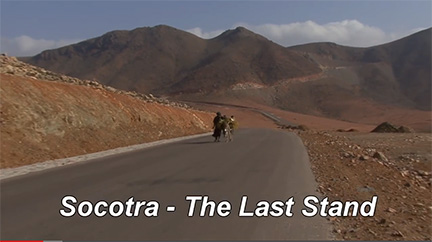
One of the remaining marvels off the east coast of Africa is the island archipelago of Socotra, historically associated with Yemen, the nation which it belongs to. Socotra is a preserve of biodiversity with a local population not yet catapulted into the under-development pains of the 21st century. There is a fascinating film about the need to protect Socotra’s unique environment and its people from the devastating impact of uncontrolled “development.” Among the individuals speaking is Dutch ecologist Paul Scholte, who has extensive research experience both in Yemen and Africa. Check out both parts of the film here and here. There are a number of Youtube videos on Socotra, but most are tourist oriented and do not match the information level of this film.
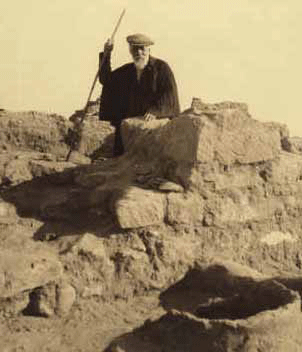
Sir Flinders Petrie, Egyptologist
An Archic Sonnet
To know what man was, ere he wrote his name,
Inscribed the laws and precepts on the rock,
And sacrificed the best lamb of the flock,
We dig the mound, and wander o’er the plain.
To learn the mysteries of the past, we fain
Would search for hidden slabs, and keep in stock
The Relics we so love. Oh, to unlock
The door, and gain an entrance to the same! Continue reading Tabsir Redux: An Archic Sonnet

Snow at the Sphinx
As the above photograph shows, even the treasured sands of Egypt are not immune to Mother Nature’s cold warnings. Snow is rare in Egypt and when it falls there is certain to be much interest in what such a climatic omen portends, especially given the mystery that surrounds the Sphinx. After Napoleon’s invasion, unsuccessful as it was from a military standpoint, Egyptomania raged in Europe. There are many poems, as well as paintings, that draw an Orientalist view of the region. Even Mark Twain set down Tom Sawyer over the pyramids. On this Christmas Eve, when the birth of Christ is celebrated throughout the world, including Egypt, it is well to remember that mystery is in the air. Given that General Sisi has admitted that his climb to power was foreordained in a dream, the mysteries coming out of Egypt are as alive as ever.
Oscar Wilde is probably not a name anyone would associate with the night before Christmas. But he did write a semi-humorous and rather long poem in 1894 entitled “the Sphinx.” The whole version can be found here, but I excerpt a few lines to assist in the holiday spirit:
A thousand weary centuries
Are thine, while I have hardly seen
Some twenty summers cast their green
For Autumn’s gaudy liveries.But you can read the Hieroglyphs
On the great sandstone obelisks,
And you have talked with Basilisks
And you have looked on Hippogriffs. Continue reading Let it Snow, dear Sphinx
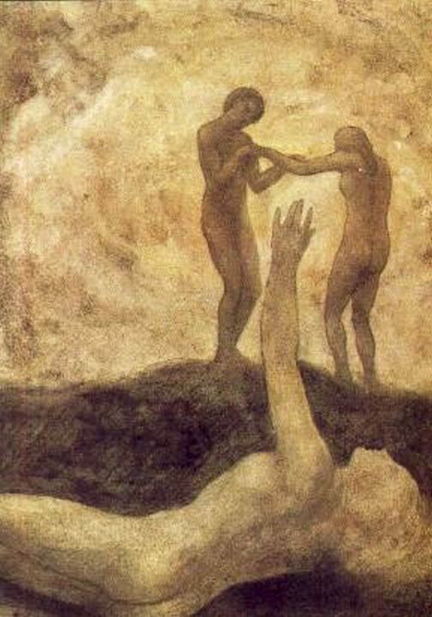
On Marriage by Khalil Gibran
The following is a response by Dr. Najib Sifri of Lebanon to the post and poem entitled “The Collapse of Tradition” by George Elhage.
كتت أعتقد٠انني لن أقرأ لجورج نقولا الØاج قصيدةً مثل ” عقدة الجنس ” بعدما Øملنا العمر ستة عقود٠من الاعوام واكثر . ولكنه يبدو ان شعر جورج كالنبيذ الغالي كلما تعتق ÙÙŠ خوابي السنين صار أطيب وارØب واكثر تأثيرا ÙÙŠ معناه ÙˆÙÙŠ مبناه ..
لقد Øملتني هذه القصيدة الى سنوات الشباب الثائر على التقاليد الجوÙاء وعلى الممنوعات السوداء وعلى المتاجرة بمصير النساء , وكأننا نعيش ÙÙŠ زمن٠غابر٠اكل الدهر٠عليه وشرب !
صØÙŠØÙŒ أنني وهو ÙÙŠ ذلك الزمن قد قطÙنا الرمان وتلذذنا بملمسه ومذاقه , ودخلنا Ùيما دخلنا اسرة الصبايا من كل نوع٠ولون٠وجنس٠ولعلنا كنا من الاستثناءات التي ساعدنا Ùيها كوننا درسنا ÙÙŠ مدارس مختلطة يجلس Ùيها هذا قرب هذه , وانتقلنا الى جامعة هي ايضا تقدس الØرية الشخصية لكل Ùرد رجلا كان او امرأة , اضاÙØ© الى اننا ننتمي الى طائÙØ© دينية غير متعصبة ونسكن ايضا ÙÙŠ امكنة لا Øجاب Ùيها ولا نقاب .
هذه القصيدة التي انشدها جورج ÙÙŠ القرن الواØد والعشرين تدلنا على انه Øتى ÙÙŠ ايامنا كان الامر اÙضل مما Ù†ØÙ† عليه اليوم , Ùبدل من ان يكون القول الى الامام سر Ø§ØµØ¨Ø Ø§Ù„Ù‰ الوراء در …
جورج من الذين يتقنون صبّ المعاني ÙÙŠ قوالبها Ùهو مهندس بارع ÙÙŠ سبك العبارة وتØميلها لصدر وعجز مناسبين تمام التناسب , وهو Ùنان ÙÙŠ ضبط الايقاع عدا انه مصور ماهر ذات خيال خصب وهذا ما يميز هذه القصيدة Øيث ان هناك كثيرين ممن كتبوا ÙÙŠ هذا الموضوع لكنهم اخÙقوا , ولعل كل بيت من أبيات هذه القصيدة ÙŠØتاج الى صÙØØ© اواكثر تدقيقا وتمØيصا وليس هنا المكان المناسب لهذا الامر , Ùليست هذه سوى رسالة شخصية لصديق يرسل الى اخيه خواطر من القلب الى القلب .
هي الثقة مشكلتنا ÙÙŠ هذا الشرق , Ùلا ثقة لام٠بابنتها , ولا ثقة لاخ٠باخته , ولا لزوج بزوجته , ولا بامة بنسائها , ولالرجل بنÙسه ,لان تواريخ الشعوب مكتوبة على وجه نسائها Ùأين تقع هذه التواريخ واين نجدها واكثر نسائنا تضع الاقنعة السوداء على وجهها رØمنا الله وهنيئاً لجورج الØاج …..

On Marriage by Khalil Gibran
The Collapse of a Tradition, from Sacred to Profane: The Abolishment of the Institution of Marriage
by George Nicolas El-Hage, Ph.D.
In the Middle East, in general, gender equality, love, sex, marriage, emotional relationships, and the proper place of women in society and in the workplace are still issues of debatable outcome and still draw mixed interpretations and polemic conclusions. Simple rights, whether a woman should be allowed to drive, to walk into a mall unescorted, to openly date and be free to choose a mate, and to climb the corporate ladder and lead a company, such topics can still fuel serious debates and bring down questionable consequences. Of course, there are cases, in many Arab countries, where the few have dared to challenge the tradition and break the norm. However, these are rare instances where a woman, or a group of women have been bold and “wild†to take such dangerous steps. Overwhelmingly, women still lag behind and remain treated as second class citizens.
I have spent the last six months in Lebanon and have witnessed firsthand the destruction of what is commonly held as the sacred “marriage institution.†Of course, there are couples who fall in love and fight for their togetherness and try to make it the old fashion way, by earning the right to a successful marriage and a happy family, but by and large, marriage has become a commodity, a sort of contract that should yield a lucrative mutual gain, a connection with benefits, at best, a necessary evil that in some cases is performed under social, parental or economic pressures. Even further, unfortunately, it has become a monetized, materialistic show of wealth intended to keep up appearances while in reality; it is rather void of romance and any traces of love burning in the heart of either partner. Continue reading The Collapse of a Tradition
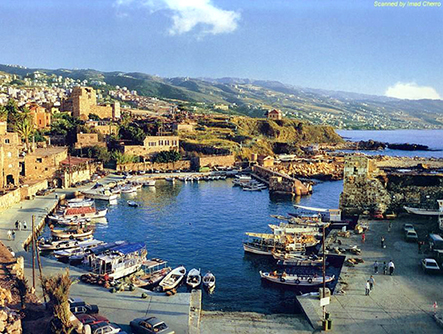
The historic town of Byblos in Lebanon
بمطعم بيبلوس يا غصون ميلي
by George El-Hage
[This poem was delivered in the Byblos Restaurant in NY City during a Zajal debate between me and Youssef Abdel Samad and attended by a large audience including the Lebanese and Saudi Ambassadors. This was the opening poem and as usual, it is a love poem in the classical format addressed to the audience and describes a Lebanese beauty where the imagery is inspired by the country itself.]
بمطعم بيبلوس يا غصون ميلي
صوبي وعاØبابي سلميلي
قولي لن نشّ٠الدمع بعيوني
مرّ الهجر وسنينو طويلي
ويا سمرة عارÙÙƒ انو Øنوني
وما بتتكØلي الا بميلي
ÙƒØلة عينتينك يا عيوني
اØلا عطور من اØلى خميلي
عنقك مشقة الارزه المصوني
وصدرك طلعة بلادي الجميلي
عيونك لونها من بØر جوني
وشعرك نسمة جنوبي العليلي
زرعتك ورد اØمر عا جÙوني
بقلبي ÙØªÙ‘Ø Ø²Ù‡ÙˆØ± الÙضيلي
كوني وين ما بدّ ك تكوني
بتبقي خمرة الØب الاصيلي
انت٠للوØÙŠ بليلة جنوني
شعر وخمر… لا تكوني بخيلي
اعطيني من Ø´Ùا٠الØمر موني
Ø´ÙاÙÙƒ للصلا اÙضل متيلي
وعنك بالجسد لو بيعدوني
بتبقى Ø§Ù„Ø±ÙˆØ Ù…Ù„ÙƒÙƒ عالقليلي
ومجد Ùقرا وروما لو عطوني
ومملكة العروش المستØيلي
وتØت الارض لولا بيدÙنوني
لما Ø´ÙاÙÙƒ تغرّد باسمي
ليك٠برجع وقلبي دليلي.